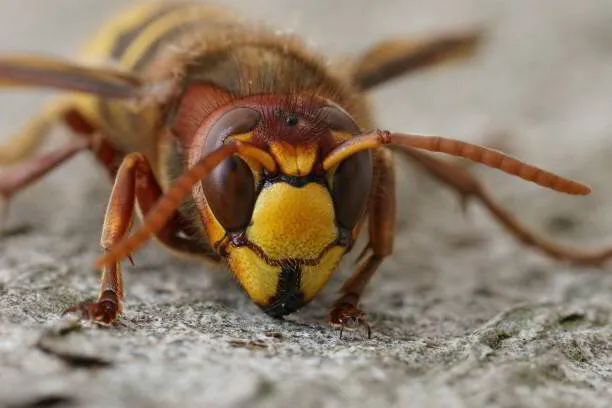New Jersey has several species of wasps. The ones that cause the most trouble are yellow jackets, bald-faced hornets (a species of wasps), and paper wasps. Wasps are beneficial insects that prey on caterpillars and other problem insects. Wasps will vigorously defend their nests by stinging intruders repeatedly. This makes them a hazard to humans.
Description Of Hornets
Bald-Faced Hornets
Bald-faced hornets are black with ivory markings on their faces and abdomen. They are about ¾ inch long. Bald-faced hornets build a large spherical paper nest that can be more than 12 inches in diameter. New fertile queens overwinter under tree bark or other small places. They start each nest in the spring. Old nests are not reused. Bald-faced hornets are not overly aggressive and can have a nest close to people without being a problem.
Yellow Jackets
The common yellow jacket is black with yellow stripes on its abdomen. They build a nest in the ground. Usually, the only sign of the nest is a hole in the ground with wasps coming out and going into it. These wasps are very aggressive when their nest is disturbed. Mowing over the hole is a common way of finding the nest and doesn’t usually end well for the person pushing or driving the mower.
Other species of yellow jackets build paper nests attached to eaves, tall plants, and inside other sheltered areas. They look similar to the common yellow jacket and are just as aggressive.
Paper Wasps
Paper wasps may be brown, reddish-brown, or black and yellow, depending on the species. The thing they all have in common is they build a paper nest with one layer of open and plugged cells. It is attached to the underside of eaves, a picnic table, branch, or tall weed with a short paper stalk. Paper wasps are not overly aggressive unless they have built a nest close to where you travel frequently.
Landscaping To Prevent Hornets
Wasps in general do not like strong aromatic herbs. Plant spearmint, eucalyptus, wormwood, or citronella around your porch and doors to repel wasps. Sweet fennel, Queen Anne’s Lace, and yarrow attract wasps, so do not plant them anywhere you do not want wasps.
Other Prevention Tips
There are other ways to prevent wasp problems. In the spring and summer, wasps search for protein to feed their growing brood. In the late summer and fall, wasps search for sugar. Be careful when consuming these things outside. Below are some tips to prevent wasps from causing a problem.
Cover food outside until you are ready to eat it.
Put trash in a wasp-proof trash can and keep the lid on tightly.
Before taking a sip of soda, look to make sure a wasp has not crawled inside the can.
Clean up spilled drinks and food promptly.
Pick up fruit that has dropped to the ground.
Fill in cracks in your foundation and outside wall so wasps cannot build a nest in the wall void.
Make sure any nectar feeders have wasp guards.
Put wasp/bee guards on your hummingbird feeders.
Get Professional Help
Wasp stings are painful. If you are allergic to wasps, you can get really sick or die from just one sting. Don’t try to get rid of wasps yourself. Many state extension services suggest hiring a professional with the right equipment and protection to eliminate the wasps around your house.
Amco Pest Solutions can eliminate the wasp nests that are causing you a problem. We give you a free estimate when you call us and can schedule a visit. When our trained technician arrives, they will inspect the house inside and out. The technician will develop a pest control treatment plan just for you to get rid of the problem wasps. After the initial treatment, you can choose a maintenance plan to keep the wasps away. Contact Amco Pest Solutions today to get rid of your problem wasps. We also provide commercial pest control solutions.

